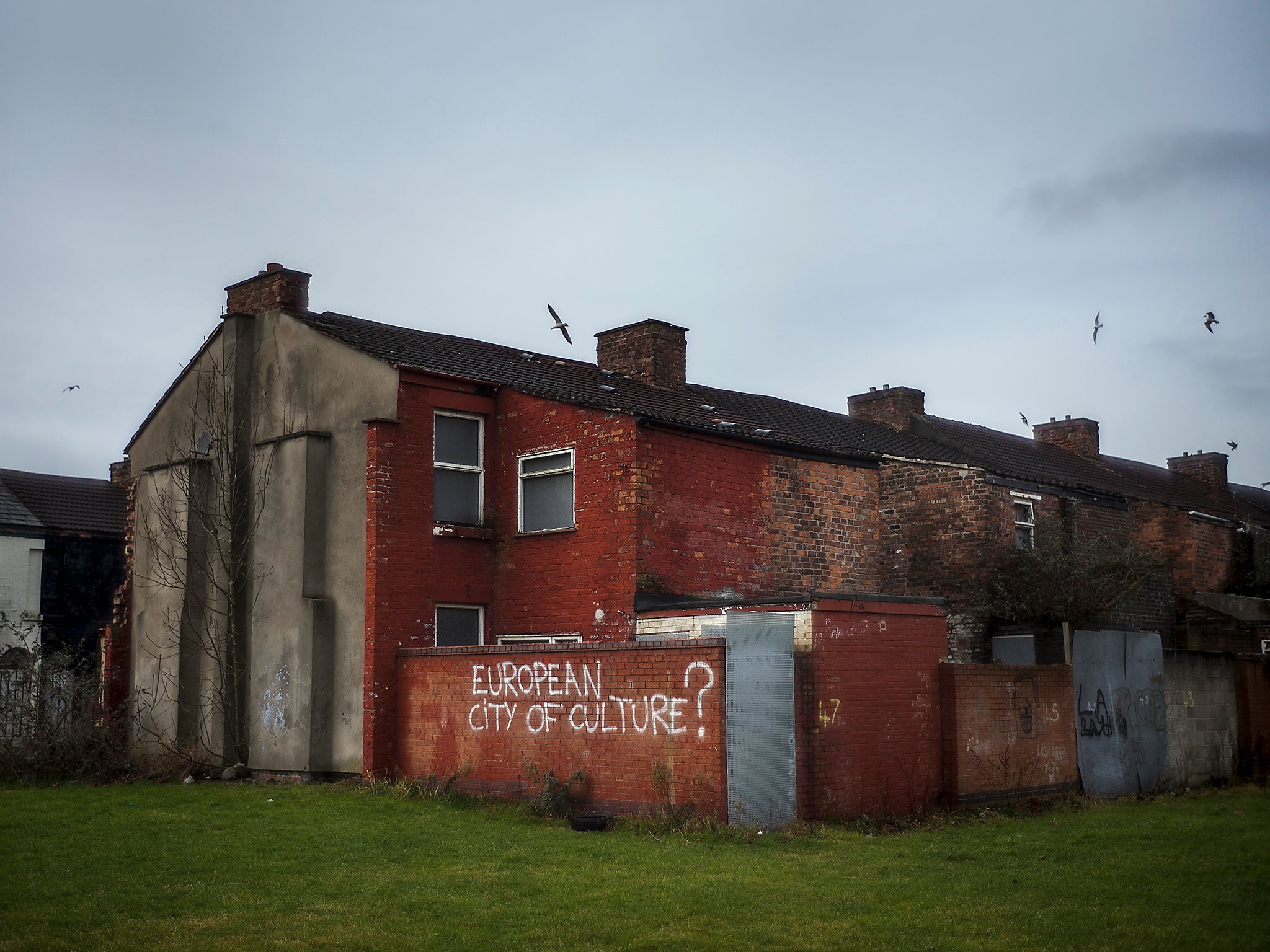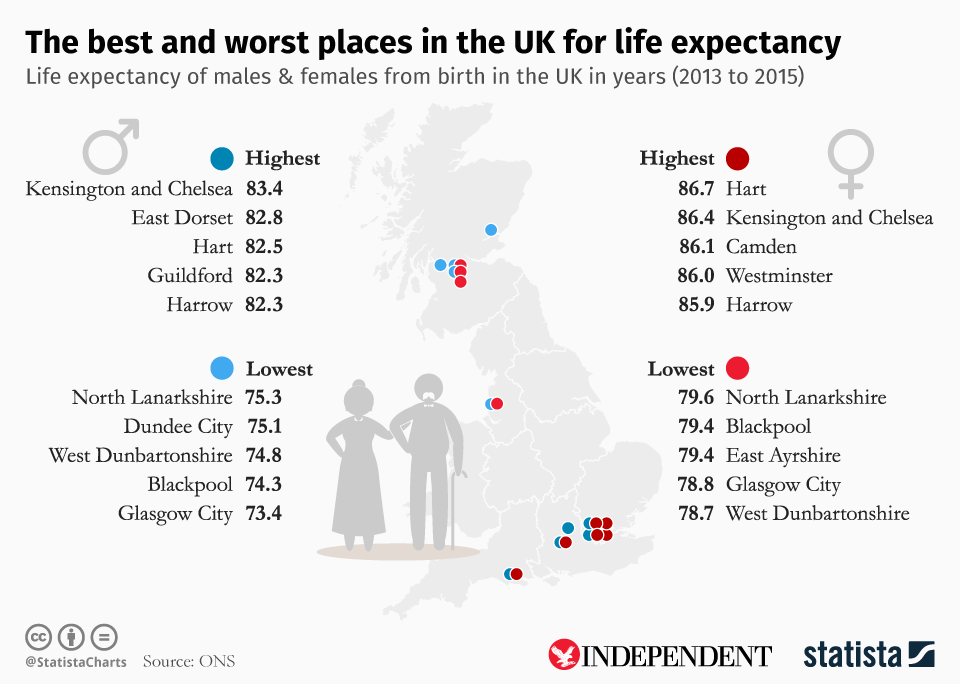People expected to die 10 years earlier in poorer parts of UK, new figures reveal
People in Kensington and Chelsea live significantly longer than those in Glasgow or Liverpool

Your support helps us to tell the story
From reproductive rights to climate change to Big Tech, The Independent is on the ground when the story is developing. Whether it's investigating the financials of Elon Musk's pro-Trump PAC or producing our latest documentary, 'The A Word', which shines a light on the American women fighting for reproductive rights, we know how important it is to parse out the facts from the messaging.
At such a critical moment in US history, we need reporters on the ground. Your donation allows us to keep sending journalists to speak to both sides of the story.
The Independent is trusted by Americans across the entire political spectrum. And unlike many other quality news outlets, we choose not to lock Americans out of our reporting and analysis with paywalls. We believe quality journalism should be available to everyone, paid for by those who can afford it.
Your support makes all the difference.People living in the poorest parts of the UK die an average of ten years earlier than those in wealthier areas, according to new official figures that reveal the true impact of inequality in Britain.
Data released by the Office for National Statistics (ONS) shows a ten-year gap in male life expectancies within the UK, while the variation among females is slightly less, at eight years.
Men living in the London borough of Kensington and Chelsea, where life expectancy is highest, are expected to live to 83.4 years, compared with just 73.4 years for a male in Glasgow City, which has the lowest male life expectancy in the UK.
The statistics for females reveal a similar trend, with a woman born in the Scottish county of West Dunbartonshire likely to live to 78.7 – eight years fewer than the 86.7 expected for a female born in the wealthy Hampshire district of Hart.
The figures reveal the stark difference in life chances depending on where a child is born. Many studies have shown poverty to be linked to earlier death but this is the first time regional life expectancy data has been collected for the whole UK.
The top 20 areas with the highest male life expectancy are all in the south of England, while 17 of the 20 areas where lives are shortest are in Scotland or northern England - highlighting the growing north-south UK divide.

As shown in the chart above, created for The Independent by statistics agency Statista, four of the five areas where women live longest are in London while 18 of the top 20 are in the south of England.
Four of the five areas with the lowest life expectancy for both men and women are in Scotland, while northern English cities including Manchester, Liverpool and Hull all feature low on the list.
Campaigners said the figures exposed the scale of inequality in the UK.
Dr Lee Elliot Major, Chief Executive of the anti-inequality charity the Sutton Trust, said: “Our research has shown how your chances of getting on in life are affected not just by your family background but by where you live too. These new figures tell us that the same is true for health.
“If the government is serious about tackling inequality, they must redouble their efforts to make sure that every child has the same chance of getting on and living a healthy life, whatever their background or wherever they live.”
Dr. Wanda Wyporska, Executive Director of The Equality Trust, said: "It can't be right that being born poor effectively means an early death sentence in this country. The UK’s extreme level of inequality, and the damage it does to our health and our society, is immense. It can't go on.
"We know that more unequal societies suffer from poorer mental and physical health, but not enough is done to narrow the gap. Over 80 per cent of Brits think inequality has gone too far; they can't keep being ignored. Unless the Government adopts a clear target to reduce inequality, the poor will continue to lose 10 years of their life, and a healthy and happy life will become the preserve of the rich."
On average, life expectancy at birth in the UK is now 79.2 years for a boy and 82.9 years for a girl. However, the fact that are people are living longer does not mean they are getting healthier.
Instead, the proportion of our lives that is spent being healthy is declining. Of the 79.2 years a baby boy is now expected to live, only 63.1 are expected to be years of good health. For girls, 63.9 years out of an expected total of 82.9 years are expected to be healthy – meaning women are now likely to spend the last 19 years of their lives in poor health.
Sarah Caul, Senior Health Researcher at the ONS, said: “Improvements to healthcare and living healthier lives mean that as a nation we are living longer and newborn boys and girls can expect to live for 79 and 83 years respectively.
"However while we are living longer we are spending a smaller proportion of our overall lives in good health which puts a greater challenge on health services.”
The figures were published as part of the ONS ‘Health state life expectancies’ data which is released one a year.
Join our commenting forum
Join thought-provoking conversations, follow other Independent readers and see their replies
Comments